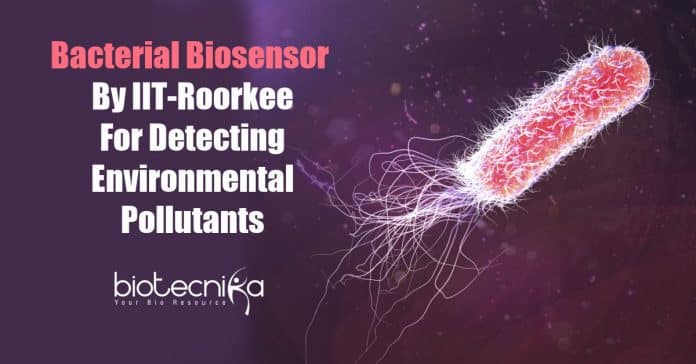Bacterial biosensor By IIT Roorkee for detecting environmental pollutants
Sodium Dodecyl Sulphate or Sodium Lauryl Sulfate (SDS) is extensively utilized in laundry cleaning agents, toothpaste, shampoos, creams, and soaps. It is the chief pollutant in industrial and domestic discharges. Its consequent disposal in water bodies causes hazardous impacts on aquatic organisms, environmental microcosms, and related living organisms. Likewise, it depreciates the quality of drinking water. If SDS is not treated, it can deteriorate the marine biodiversity and pollute land and water-bodies. Previously, there were no explicit biosensors developed till now for detecting SDS with high accuracy.
A group of scientists from the Indian Institute of Technology Roorkee (IIT-R) asserted to have developed the very first explicit reliable bacterial biosensor for detecting the presence of SDS. As per the scientists, for their study, they genetically remodeled the DNA of a particular bacterium (Pseudomonas aeruginosa – Gram-negative bacteria which causes diseases in plants, animals, and humans).
Naveen Kumar Navani, Department of Biotechnology, IIT Roorkee, stated that they had developed a biosensor for detecting the hazardous cleaning agents in the environment after remodeling the bacterial DNA (which provides a sign with a green fluorescent protein. The most important part of this bacterial biosensor
is its sensitivity to even a minute amount of SDS in the environment, and unlike conventional methods, it can differentiate between SDS and SDBS (Salt dodecyl benzenesulfonate).Sourik Dey, MSc student, IIT Roorkee, and lead author of the study stated that this is the very first whole-cell bacterial biosensor developed for specific, direct, and effective detection of Sodium Dodecyl Sulphate, without entailing sample preparation process, hazardous chemicals, innovative polymers, and sensor development process.
The outcomes of the study are released in Biosensors and Bioelectronics. The study team includes Naveen Kumar Navani, Rajat Dhyani, Sourik Dey, Ankita Bhatt, and Shahnawaz Ahmad Baba.
Bacterial biosensor By IIT Roorkee for detecting environmental pollutants






























